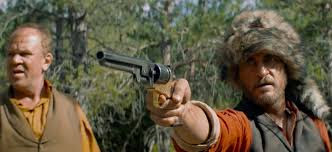 |
| "My right hand was thunder..." The Sisters Brothers |
Jacques Audiard's The Sisters Brothers is a competent condensation of Patrick deWitt's novel, but it fails to fully capture the novel's sardonic tone and invention. Audiard, as previously in his work, displays a sure hand with his players. John C. Reilly, Riz Ahmed and Joaquin Phoenix all do good work. Even Jake Gyllenhaal, who has marred good films like Okja with his unrestrained antics, offers a measured and nuanced performance. Yet, something is missing.
I have been reading Thomas Hardy's Far From the Madding Crowd and been musing upon the relatively unsatisfactory 1967 film version. The decor and costumes of the John Schlesinger film are exemplary, as is Nicholas Roeg's cinematography. The casting of Julie Christie, Alan Bates, Terence Stamp and Peter Finch could not be bettered and they all deliver fine performances. However, Schlesinger fails to capture the moral crux of the novel. The direction is anonymous and workmanlike. Far From the Madding Crowd is a nice enough film that lacks the impact of the novel because the tone and effectiveness of a film lies with the director and his aesthetic choices.
The story of The Sisters Brothers provides a promising blueprint for a film, but Audiard's direction lacks the panache and narrative drive that deWitt infuses his novel with. Part of the reason is structural, deWitt's short chapters provide an enclosed start and finish to each vignette within the somewhat picaresque story. Audiard's narrative flows like a river with the focus constantly shifting from pursuer to pursued. The moral nexus of deWitt's work is focused. Audiard's ribbon of events unspools pointlessly.
This is also due to anonymous nature of Audiard's Oregon where most of the action of the film and book take place. The film's setting is a generic Western one, really Spain and Romania, without the sense of place the novel has. deWitt also more effectively utilizes violence to emphasize the amoral nature of the Old West. Audiard is shaky as a director of action. The thunderous sound and flashing flames that emit from the weaponry is memorably illustrated. However, the carnage that the brothers unleash has no emotional impact upon the viewer because the antagonists are blank figures. Audiard is so intent on evoking the confusion and destructiveness of violence that he leaves his audience confused as to who the various gunmen are. The lack of a point of view may be Audiard's attempt to evoke the amoral universe of the tale, but it leaves viewers without a narrative voice to guide them.
Another example of the film's shortcomings is the lack of emotional resonance after the death of Eli Sisters' one eyed horse. deWitt slowly builds the empathy Eli has for his horse so that the horse's demise resonates and clues us into Eli's sensitivity. Audiard stresses the suffering of the horse, but not Eli's growing attachment. Thus, when John C. Reilly gives a moving eulogy about the horse, the effect is negligible; and that is the ultimate effect of the film.





No comments:
Post a Comment